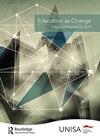Social Movement Research in/and Struggles for Change: Research for What and For Whom?
IF 1
4区 教育学
Q3 EDUCATION & EDUCATIONAL RESEARCH
引用次数: 0
Abstract
Research is key to daily organising and struggles for social, political, economic and environmental justice. If research is to be useful in organising and struggles for change, it cannot be something that metaphorically or literally sits on a shelf or behind a paywall, and is inaccessible or irrelevant to the communities, movements and publics whose concerns, issues and lives it engages with, and who may also well be the foundations of much of the knowledge it draws on. This article discusses some of the ways in which activist researchers—or activists who do research as part of their organising/activism—understand and practise research, and the purposes and processes of knowledge production. It offers guideposts for scholars and academics who are keen to do research with, for and about social movements. What are some of the sources of such knowledge? How is this knowledge produced? How do such practices relate to professionalised forms of research and expertise? How might such research practices foster the building or strengthening of collective agency?社会运动研究和变革斗争:为什么和为谁而研究?
研究是日常组织和争取社会、政治、经济和环境正义的斗争的关键。如果研究要在组织变革和争取变革的斗争中发挥作用,它就不能是隐喻性的或字面上的东西,不能是放在架子上或在收费墙后面,不能是与社区、运动和公众接触或无关的东西,这些社区、运动和公众所关注的问题和生活,也可能是它所借鉴的许多知识的基础。本文讨论了一些激进的研究人员——或将研究作为其组织/行动主义的一部分的活动家——理解和实践研究的方式,以及知识生产的目的和过程。它为那些热衷于研究社会运动的学者和学者提供了指导。这些知识的来源是什么?这些知识是如何产生的?这些实践如何与专业化形式的研究和专业知识联系起来?这样的研究实践如何促进集体能动性的建立或加强?
本文章由计算机程序翻译,如有差异,请以英文原文为准。
求助全文
约1分钟内获得全文
求助全文
来源期刊

Education As Change
EDUCATION & EDUCATIONAL RESEARCH-
CiteScore
1.40
自引率
0.00%
发文量
29
审稿时长
24 weeks
期刊介绍:
Education as Change is an accredited, peer reviewed scholarly online journal that publishes original articles reflecting critically on issues of equality in education and on the ways in which educational practices contribute to transformation in non-formal, formal and informal contexts. Critique, mainly understood in the tradition of critical pedagogies, is a constructive process which contributes towards a better world. Contributions from and about marginalised communities and from different knowledge traditions are encouraged. The articles could draw on any rigorous research methodology, as well as transdisciplinary approaches. Research of a very specialised or technical nature should be framed within relevant discourses. While specialised kinds of research are encouraged, authors are expected to write for a broader audience of educational researchers and practitioners without losing conceptual and theoretical depth and rigour. All sectors of education are covered in the journal. These include primary, secondary and tertiary education, adult education, worker education, educational policy and teacher education.
 求助内容:
求助内容: 应助结果提醒方式:
应助结果提醒方式:


